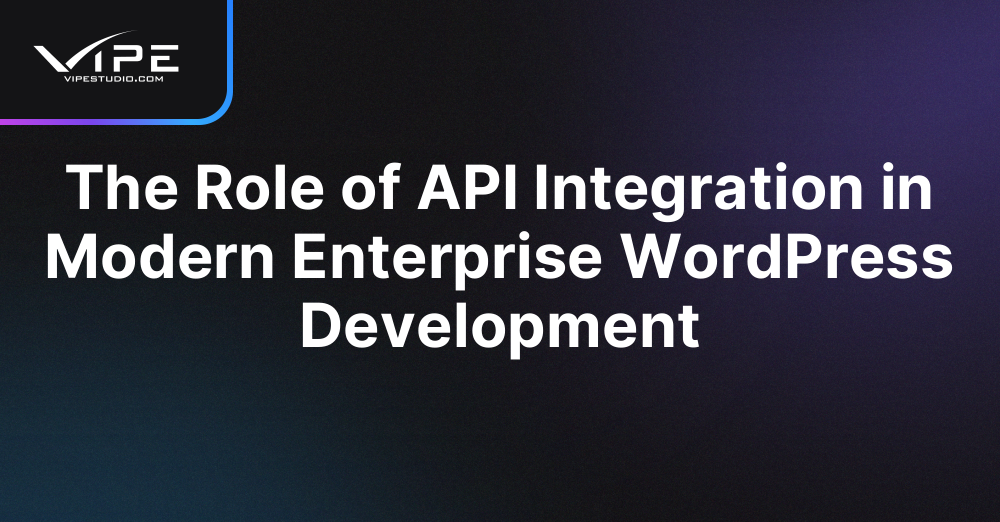13.12.2024
WordPress Development
The Role of API Integration in Modern Enterprise WordPress Development
READING TIME: MIN
Table of Content
As businesses expand their digital footprints, the need for seamless integration between various platforms and systems becomes more critical. For enterprises relying on WordPress, API integration serves as a cornerstone for connecting different tools, enhancing functionality, and streamlining workflows. This article delves into the role of API integration in modern enterprise WordPress development and how it transforms digital operations.
What Is API Integration and Why Is It Important?
API (Application Programming Interface) integration refers to the process of connecting different software applications to enable them to communicate and share data. For enterprises, API integration is essential for:
- Streamlining Operations: APIs connect disparate systems, enabling them to work together efficiently.
- Enhancing Functionality: Enterprises can extend the capabilities of WordPress by integrating third-party tools like CRMs, ERPs, and analytics platforms.
- Improving User Experiences: Seamless integrations ensure consistent and engaging experiences for end-users.
For WordPress-based enterprises, API integration unlocks endless possibilities for customization and scalability.
How APIs Extend WordPress Functionality for Enterprises
WordPress, by itself, is a powerful CMS, but its capabilities can be amplified through APIs. Here’s how API integration enhances WordPress for enterprise use:
- Connecting Third-Party Services: APIs enable WordPress to integrate with services like Salesforce, HubSpot, and Google Analytics for data synchronization and reporting.
- E-Commerce Enhancements: Integrating payment gateways, inventory systems, and shipping providers makes WordPress a robust platform for large-scale e-commerce operations.
- Custom Applications: APIs allow developers to connect WordPress with proprietary enterprise applications for tailored solutions.
- Headless Implementations: Using APIs, WordPress can serve as a backend CMS while modern frameworks like React or Next.js power the frontend.
These integrations make WordPress a highly versatile and scalable platform for enterprise-level projects.
Use Cases for API Integration in WordPress Enterprise Solutions
Enterprises across various industries leverage API integration to solve specific challenges. Here are some notable use cases:
- Omnichannel Marketing: APIs connect WordPress with marketing automation tools, social media platforms, and ad networks to deliver cohesive campaigns.
- Data Management: Enterprises can integrate WordPress with data warehouses or visualization tools for real-time insights and analytics.
- Customer Relationship Management (CRM): APIs allow WordPress to sync with CRMs like Salesforce or Zoho, ensuring seamless customer data management.
- Membership Platforms: Integrations with subscription and payment services enable enterprises to manage memberships and recurring billing efficiently.
These use cases highlight the strategic value of API integration in solving complex business challenges.
Challenges in Implementing API Integration with WordPress
Despite its advantages, implementing API integration with WordPress is not without challenges:
- Compatibility Issues: Not all APIs are designed with WordPress in mind, requiring custom development to ensure compatibility.
- Security Risks: APIs can be a target for cyberattacks. Proper authentication and encryption are essential for secure integration.
- Performance Overheads: Poorly optimized APIs can slow down website performance, particularly for high-traffic enterprise websites.
- Maintenance and Updates: Keeping APIs updated and ensuring compatibility with WordPress core updates requires ongoing effort.
Working with experienced developers helps enterprises address these challenges effectively.
Technologies Supporting WordPress API Integration
Several technologies and tools facilitate seamless API integration with WordPress. Here are some key ones:
- REST API: The WordPress REST API is a powerful tool for connecting WordPress with other applications.
- GraphQL: GraphQL offers a flexible query language for fetching data, often used in headless WordPress setups.
- OAuth Authentication: OAuth ensures secure access and data sharing between WordPress and third-party applications.
- Middleware Solutions: Tools like Zapier or custom middleware help bridge compatibility gaps between APIs.
These technologies play a crucial role in creating robust and reliable integrations.
Vipe Studio: Your Partner in WordPress API Integration
At Vipe Studio, we specialize in enterprise WordPress development, including API integration. Our team ensures seamless connections between WordPress and third-party tools, enabling enterprises to streamline operations and enhance functionality. Whether it’s integrating a CRM, building a headless WordPress solution, or developing custom applications, we provide tailored solutions to meet your needs.
Ready to leverage API integration for your enterprise? Contact Vipe Studio today to explore how we can transform your WordPress platform.
Conclusion: Empowering Enterprises with API Integration
API integration is a critical component of modern enterprise WordPress development. By connecting WordPress with other platforms and tools, businesses can streamline workflows, enhance functionality, and deliver superior user experiences. With the right strategy and expertise, enterprises can unlock the full potential of their WordPress platforms through seamless API integration.
More on The Topic
- The Dark Side of WordPress Plugins: A Provocative Exploration
- The Human Cost of Poor WordPress Architecture
- Governance, Ownership, and Responsibility in WordPress Projects
- Product Thinking in WordPress Development
- WordPress Architecture Decisions and Their Business Impact
The content of this website is copyrighted and protected by Creative Commons 4.0.



